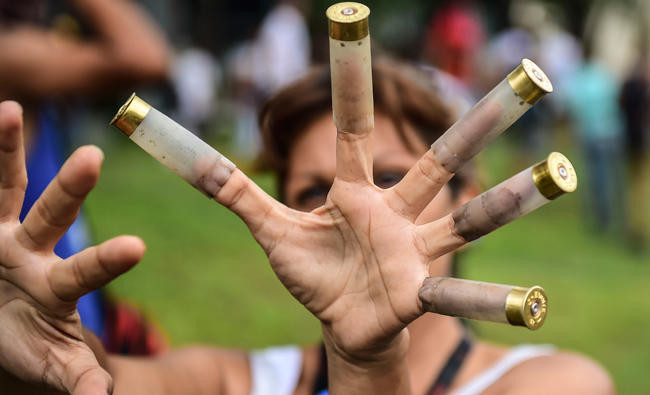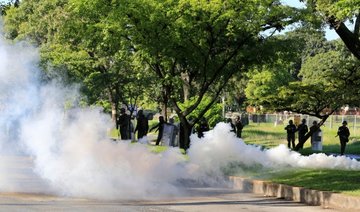VALENCIA: Venezuela’s military was hunting a group of “mercenaries” on Monday who made off with weapons after an attack on an army base carried out against what they called the “murderous tyranny” of President Nicolas Maduro.
Around 20 men led by an army officer who had deserted battled troops in the base in the third city of Valencia for three hours early Sunday, officials said.
The raid ended with two of the attackers being killed and eight captured, Maduro said on state television.
The other 10 escaped with weapons taken from the facility, according to officials who said an “intense search” was underway for them.
Maduro claimed the “terrorist” group had ties to Colombia and the US.
The incident heightened fears that Venezuela’s deepening political and economic crisis could explode into greater violence, perhaps open armed conflict.
Officials insisted afterward that all was normal across the country.
Military helicopters flew overhead and tactical armored vehicles patrolled the streets in Valencia, a major northwestern city, in a climate of tension on Sunday after the attack.
Locals said a nighttime curfew was imposed. Police dispersed protesters who had set up flaming barricades across roads.
The armed forces said in a statement “a group of civilian criminals wearing military uniforms and a first lieutenant who had deserted” carried out the attack.
Maduro said the lieutenant, among those captured, was “actively giving information and we have testimony from seven of the civilians.”
Maduro congratulated the army for its “immediate reaction” in putting down the attack, saying they earned his “admiration.”
Venezuela’s opposition has repeatedly urged the military to abandon Maduro.
But Defense Minister Vladimir Padrino, the head of the armed forces, has said the military’s loyalty was unshakable.
In a video posted online just before the attack, a man presenting himself as an army captain named Juan Caguaripano declared a “legitimate rebellion... to reject the murderous tyranny of Nicolas Maduro.”
Speaking with 15 men in camouflage standing by him, some of them armed, he demanded a transitional government and “free elections.”
It was not known if he was the lieutenant referred to in the military statement, demoted for deserting, or whether he was another renegade officer.
That statement said the lieutenant involved had deserted three years ago and taken refuge in Miami, in the US state of Florida.
Venezuela has become increasingly isolated internationally as Maduro tightens his hold on power through a contested loyalist assembly that started work this week.
The opposition, which controls the legislature, has been sidelined. Its leaders are under threat of arrest after organizing protests — fiercely countered by security forces — that have left 125 people dead in the past four months.
The new Constituent Assembly, packed with Maduro allies including the president’s wife and son, has quickly used its supreme powers to clamp down on dissent.
On Saturday, it ordered the dismissal of the attorney general, Luisa Ortega, who had broken ranks with Maduro to become one of his most vociferous critics.
The US accuses Maduro of installing an “authoritarian dictatorship” that has turned Venezuela into an international pariah.
The US, Brazil, Colombia, Chile, Guatemala, Mexico, Panama and Peru have slammed the “illegal” sacking of Ortega.
And Argentina, Uruguay, Paraguay and Brazil have indefinitely suspended Venezuela from the South American trading bloc Mercosur for its “rupture of the democratic order.”
“Each step by the Constituent Assembly is a step toward the precipice by this government,” the leader of the opposition parliament, Julio Borges, told a news conference in Caracas on Sunday.
“The only thing it has left is brute force... The only thing it wants is to cling to power,” he said, calling for more protests.


Venezuela army hunts assailants after attack on base
Venezuela army hunts assailants after attack on base

Olympic town warms up as climate change puts Winter Games on thin ice
CORTINA D’AMPEZZO: Olympic fans came to Cortina with heavy winter coats and gloves. Those coats were unzipped Sunday and gloves pocketed as snow melted from rooftops — signs of a warming world.
“I definitely thought we’d be wearing all the layers,” said Jay Tucker, who came from Virginia to cheer on Team USA and bought hand warmers and heated socks in preparation. “I don’t even have gloves on.”
The timing of winter, the amount of snowfall and temperatures are all less reliable and less predictable because Earth is warming at a record rate, said Shel Winkley, a Climate Central meteorologist. This poses a growing and significant challenge for organizers of winter sports; The International Olympic Committee said last week it could move up the start date for future Winter Games to January from February because of rising temperatures.
While the beginning of the 2026 Olympic Winter Games in Cortina truly had a wintry feel, as the town was blanketed in heavy snow. The temperature reached about 40 degrees Fahrenheit (4.5 degrees Celsius) Sunday afternoon. It felt hotter in the sun.
This type of February “warmth” for Cortina is made at least three times more likely due to climate change, Winkley said. In the 70 years since Cortina first held the Winter Games, February temperatures there have climbed 6.4 degrees Fahrenheit (3.6 degrees Celsius), he added.
Coping with varying climates across host cities
For the Milan Cortina Games, there’s an added layer of complexity. It’s the most spread-out Winter Games in history, so Olympic venues are in localities with very different weather conditions. Bormio and Livigno, for example, are less than an hour apart by car, but they are separated by a high mountain pass that can divide the two places climatically.
The organizing committee is working closely with four regional and provincial public weather agencies. It has positioned weather sensors at strategic points for the competitions, including close to the ski jumping ramps, along the Alpine skiing tracks and at the biathlon shooting range.
Where automatic stations cannot collect everything of interest, the committee has observers — “scientists of the snow”— from the agencies ready to collect data, according to Matteo Pasotti, a weather specialist for the organizing committee.
The hope? Clear skies, light winds and low temperatures on race days to ensure good visibility and preserve the snow layer.
The reality: “It’s actually pretty warm out. We expected it to be a lot colder,” said Karli Poliziani, an American who lives in Milan. Poliziani was in Cortina with her father, who considered going out Sunday in just a sweatshirt.
And forecasts indicate that more days with above-average temperatures lie ahead for the Olympic competitions, Pasotti said.
Weather can affect competition
Weather plays a critical role in the smooth running and safety of winter sports competitions, according to Filippo Bazzanella, head of sport services and planning for the organizing committee. High temperatures can impact the snow layer on Alpine skiing courses and visibility is essential. Humidity and high temperatures can affect the quality of the ice at indoor arenas and sliding centers, too.
Visibility and wind are the two factors most likely to cause changes to the competition schedule, Bazzanella added. Wind can be a safety issue or a fairness one, such as in the biathlon where slight variations can disrupt the athletes’ precise shooting.
American alpine skier Jackie Wiles said many races this year have been challenging because of the weather.
“I feel like we’re pretty good about keeping our heads in the game because a lot of people are going to get taken out by that immediately,” she said at a team press conference last week. “Having that mindset of: it’s going to be what it’s going to be, and we still have to go out there and fight like hell regardless.”
“I definitely thought we’d be wearing all the layers,” said Jay Tucker, who came from Virginia to cheer on Team USA and bought hand warmers and heated socks in preparation. “I don’t even have gloves on.”
The timing of winter, the amount of snowfall and temperatures are all less reliable and less predictable because Earth is warming at a record rate, said Shel Winkley, a Climate Central meteorologist. This poses a growing and significant challenge for organizers of winter sports; The International Olympic Committee said last week it could move up the start date for future Winter Games to January from February because of rising temperatures.
While the beginning of the 2026 Olympic Winter Games in Cortina truly had a wintry feel, as the town was blanketed in heavy snow. The temperature reached about 40 degrees Fahrenheit (4.5 degrees Celsius) Sunday afternoon. It felt hotter in the sun.
This type of February “warmth” for Cortina is made at least three times more likely due to climate change, Winkley said. In the 70 years since Cortina first held the Winter Games, February temperatures there have climbed 6.4 degrees Fahrenheit (3.6 degrees Celsius), he added.
Coping with varying climates across host cities
For the Milan Cortina Games, there’s an added layer of complexity. It’s the most spread-out Winter Games in history, so Olympic venues are in localities with very different weather conditions. Bormio and Livigno, for example, are less than an hour apart by car, but they are separated by a high mountain pass that can divide the two places climatically.
The organizing committee is working closely with four regional and provincial public weather agencies. It has positioned weather sensors at strategic points for the competitions, including close to the ski jumping ramps, along the Alpine skiing tracks and at the biathlon shooting range.
Where automatic stations cannot collect everything of interest, the committee has observers — “scientists of the snow”— from the agencies ready to collect data, according to Matteo Pasotti, a weather specialist for the organizing committee.
The hope? Clear skies, light winds and low temperatures on race days to ensure good visibility and preserve the snow layer.
The reality: “It’s actually pretty warm out. We expected it to be a lot colder,” said Karli Poliziani, an American who lives in Milan. Poliziani was in Cortina with her father, who considered going out Sunday in just a sweatshirt.
And forecasts indicate that more days with above-average temperatures lie ahead for the Olympic competitions, Pasotti said.
Weather can affect competition
Weather plays a critical role in the smooth running and safety of winter sports competitions, according to Filippo Bazzanella, head of sport services and planning for the organizing committee. High temperatures can impact the snow layer on Alpine skiing courses and visibility is essential. Humidity and high temperatures can affect the quality of the ice at indoor arenas and sliding centers, too.
Visibility and wind are the two factors most likely to cause changes to the competition schedule, Bazzanella added. Wind can be a safety issue or a fairness one, such as in the biathlon where slight variations can disrupt the athletes’ precise shooting.
American alpine skier Jackie Wiles said many races this year have been challenging because of the weather.
“I feel like we’re pretty good about keeping our heads in the game because a lot of people are going to get taken out by that immediately,” she said at a team press conference last week. “Having that mindset of: it’s going to be what it’s going to be, and we still have to go out there and fight like hell regardless.”
© 2026 SAUDI RESEARCH & PUBLISHING COMPANY, All Rights Reserved And subject to Terms of Use Agreement.











